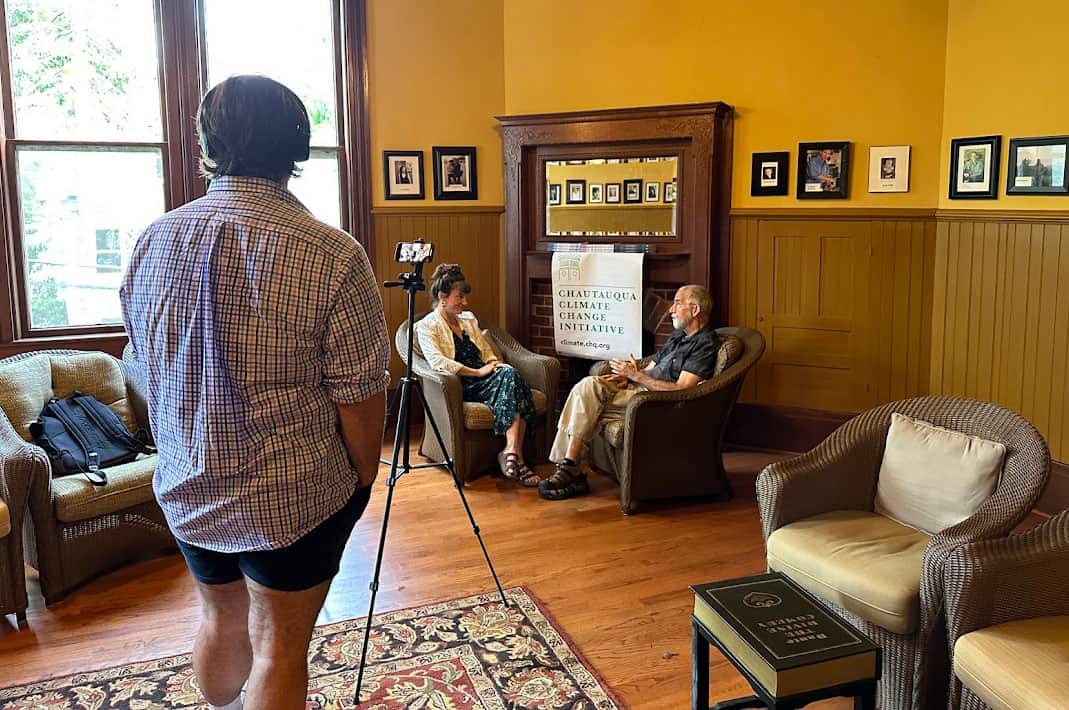Empathy to the Rescue
How Stories Help Us Find Common Ground on Climate Change
The human suffering wrought by hurricanes Helene and Milton in the southeastern United States remind us as the climate crisis deepens, communities across the nation desperately need everyone working together toward solutions. But too often these days, political and social divisions stand in the way of understanding and collaboration — leading to stalemate, inaction and the next climate-fueled tragedy. We need only hear stories of armed militias confronting FEMA responders to understand how deeply polarized our country has become.
It’s far more difficult for divided communities to solve a host of problems, not the least of which being climate change. Researchers studying polarization have found that for people to work effectively together, they must first empathize with each other. As Stanford University psychologist Jamil Zaki, PhD, describes it, empathy is the “psychological ‘superglue’ that connects people and undergirds cooperation and kindness.”
The power of empathy to connect us across difference was explored by Chautauqua in 2021 during our weeklong focus on “Building a Culture of Empathy.” More than a dozen speakers addressed the importance of empathy “as a critical part of our world, what it looks like in action, and how we can normalize it to help us connect and survive tragic times.”
As our world increasingly suffers the effects of human-caused climate change, from devasting wildfires to drought-fueled crop failures to deadly floods and heatwaves to mass extinctions, these sure do feel like “tragic times.” Can empathy help us survive?
While empathy won’t end the climate crisis, it could help us heal the divides in our communities that can stand in the way of action, whether those divisions are grounded in politics, economic status, religion, race, ethnicity, generational concerns, or other factors. As professor Zaki has postulated, empathy “could be an emotional bulwark against a warming world, if our collective care produced collective action.”
In 2022–2023 Chautauqua set out to examine whether the empathy lessons we learned in our 2021 season could help move the needle on climate change. Informed by studies demonstrating that higher levels of empathy correlate to improved environmental attitudes and behaviors, our three-part online series, “Empathy to Action,” gathered social scientists, academics, writers and musicians, and to explore how empathy-based storytelling could help individuals and communities find common ground on climate change.
We focused on storytelling because it’s a familiar way for people to learn to access feelings of empathy for others. As one of our experts found in a 2020 study, “sharing personal stories of how climate change is already harming people is a promising communication strategy to engage diverse and even skeptical audiences.”
We continued our empathy exploration through in-person workshops during Chautauqua’s 2022, 2023 and 2024 seasons. Our 2024 workshop did a deep dive into how storytelling might help bridge just one of the divides on climate change: generational. Lack of understanding across generations can sometimes lead to counterproductive finger-pointing about who caused the climate crisis and who is responsible for fixing it, making collaboration and consensus more difficult to achieve.
We worked with former CNN bureau chief and George Washington University climate leader Frank Sesno to construct an intergenerational climate storytelling workshop. We had 20 participants, half younger and half older. The elders included members of Bill McKibben’s Third Act climate group for people over 60 and longtime Chautauquans. The younger participants ranged from high school and college students to young adults.
Working in cross-generational pairs, the participants interviewed each other (“StoryCorps” style) about their experiences with climate change and their hopes and fears for the future. By the end of the workshop, participants formed deeper understanding and empathy for each other and even made plans to work together. The videos of their interviews are incredibly moving. We can’t wait to show them to you soon.
With each step along Chautauqua’s empathy journey, I’ve become more convinced than ever that empathy really is the “secret sauce” that can heal divisions and forge consensus for climate solutions. If we can just make the time to hear each other’s stories, we can discover how much we really do have in common and how closely aligned we are on wanting a healthy resilient future for ourselves, our families and our communities.
So, what’s the next stop on our empathy journey? For me it’s figuring out how to turn empathy into action. Once people understand each other better, how can we get them to work together on solutions? I don’t have all the answers yet, but after the summer I’ve been busy meeting with our partners at George Washington University’s Alliance for a Sustainable Future. I think we’ve got some great ideas for how to help communities bridge divides and take effective, collective action on climate change. I hope you’ll join us in the next phase of our empathy journey. Stay tuned for details in the coming months.
Save Your Trip
Fill out the form below to save your trip. You will receive a link to your saved list via email.
Save Your Favorites
Fill out the form below to save your favorites. You will receive a link to your favorites list via email.
"*" indicates required fields
Notice!
You have now entered the season. Some website content may differ depending on the current season we are in: Summer or Fall/Winter/Spring. You can toggle between the two season options at any time.
